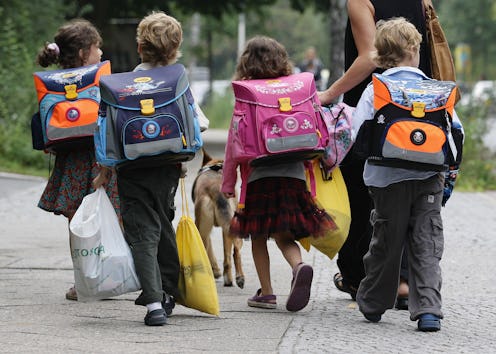Think back to childhood for a moment. Think back to being in elementary school. If you were the "four eyes" or "the fatty" or maybe even the "ginger" then it's quite feasible that any nostalgia surrounding your days as a student is tainted with good, old fashioned bullying memories.
That children can be cruel, malicious even, is no surprise — as you grow up, you may even pin these traits to classic human behavior. But if you were one of the bullied, you hopefully at least had the consolation of a few good teachers — supportive adults you could turn to in times of distress and anguish and peer-induced self-deprecation. Now imagine the adults were on the side of the bullies. Imagine having no one in school to turn to. Imagine how that would stay with you — that sense of having no one who will listen, understand — through your life.
When the news surfaced that American schools have started administering "Fitnessgrams," otherwise known as "Obesity Report Cards," the fear that school teachers and administrators will now be significantly adding to childhood woes, and to the probabilities of childhood depression and perhaps even eating disorders, inevitably surfaced along with it. After testing children's abilities in timed running or walking trials as well as curl-ups, and calculating their Body Mass Index (BMI), schools will determine whether a child is medically "obese" and proceed to send letters home to parents and guardians to notify them.
That these "report cards" exist at all is problematic. They bring into question whether schools have the right to dictate to parents how to monitor their child's weight or diet. Not to mention that they often get it wrong, failing to account (as is usual with BMI calculations) for muscle mass, bone structure or actual health. In some cases, students are able to discern how absurd these calculations and letters are. Cameron Watson of North Andover, an active football player in the fourth grade, received a "fat letter" claiming he was obese. Luckily, he didn't let that mess with his self-esteem. Cameron told The Young Turks, "I know I'm not obese, so I didn't really care about the letter. I just crumpled it up."
But for some kids, it isn't easy to brush off the fact that your teachers and administrators and the grown-ups who are supposedly on your side are telling you that you need to change your body. One mother, a member of Mothers Against Eating Disorders (MEAD), told Liberty Voice that her daughter's weight was actually announced to everyone in her gym class after she was publicly weighed in front of her peers. That such a public demonstration of humiliation should occur at the hands of adults meant to protect children is almost unbelievable (and undoubtedly unnecessary), and no doubt contributes to that girl's low self-esteem, as her mother pointed out.
Nine-year-old Gwendolyn Williams of Staten Island also received an obesity report card. According to Jezebel, Williams proceeded to talk to her mom about it. "'Hey, Mom. The school told me I'm overweight.' And then she started jiggling her thighs, and saying, 'Is this what they mean?'" One look at this smily pre-teen will show she's actually quite a skinny kid. There doesn't appear to be an ounce of fat on her body. And yet, her school is telling her she's fat, thus encouraging the thigh gap obsession to continue and feeding the unhealthy body perceptions kids are already presented with enough on a daily basis.
The Academy for Eating Disorders also opposes these obesity report cards, their doubts "based upon the understanding that the way that a growing child’s body develops muscle means their body mass composition needs to be different from that of an adult, thus rendering BMI invalid as a measure for obesity in children," as Tabitha Farrar of Liberty Voice writes. The thing is, this should be obvious, and the fact that schools are failing to realize as much truly puts into question how educated the educators actually are.
Schools' justification for administering these report cards have to do, no doubt, with their concerns about instilling healthy diet and exercise habits within their students (an admirable goal at the core), but most likely also with the growing fear of childhood obesity and its links to premature illnesses. As reported by USA Today, though, childhood obesity rates have actually dropped 43 percent in the past decade. "Among kids ages 2 to 5 the obesity rate dropped from 14 percent in 2003-2004 to just over 8 percent in 2011-2012, according to a report out Tuesday from the Centers for Disease Control and Prevention. That represents a drop of 43 percent." There has been such a monumental decline in these rates, and yet, schools are becoming more involved than ever, pushing their boundaries and entering territories perhaps better left to parents and actual medical professionals.
What we know without a doubt is that childhood is difficult. School is difficult. And when you are the least bit different to the majority of your peers, those difficulties skyrocket. The role of adults in the education system should be one of support — not blame, not criticism, not contempt. Peers bully others enough, without the grown-ups needing to follow suit.
